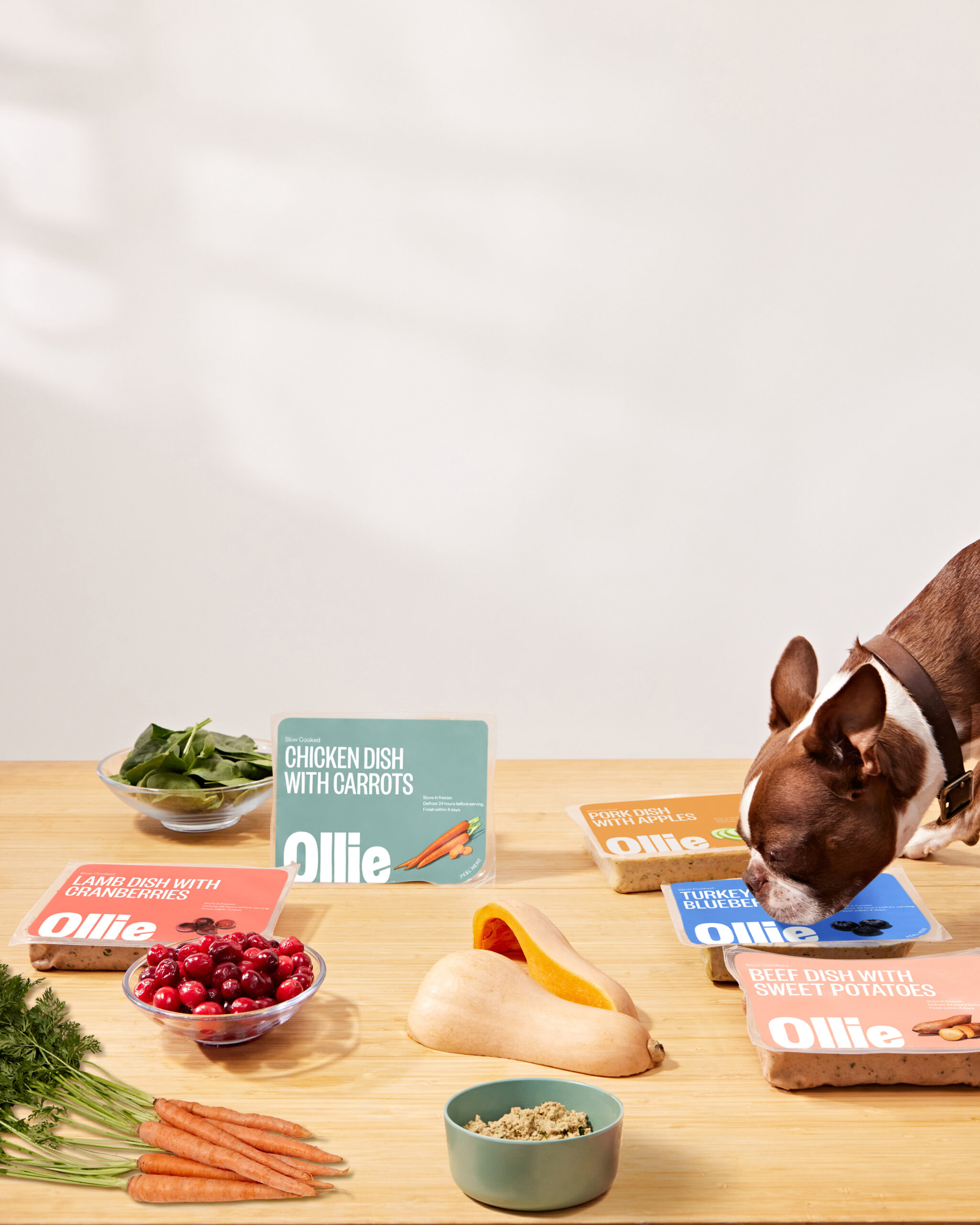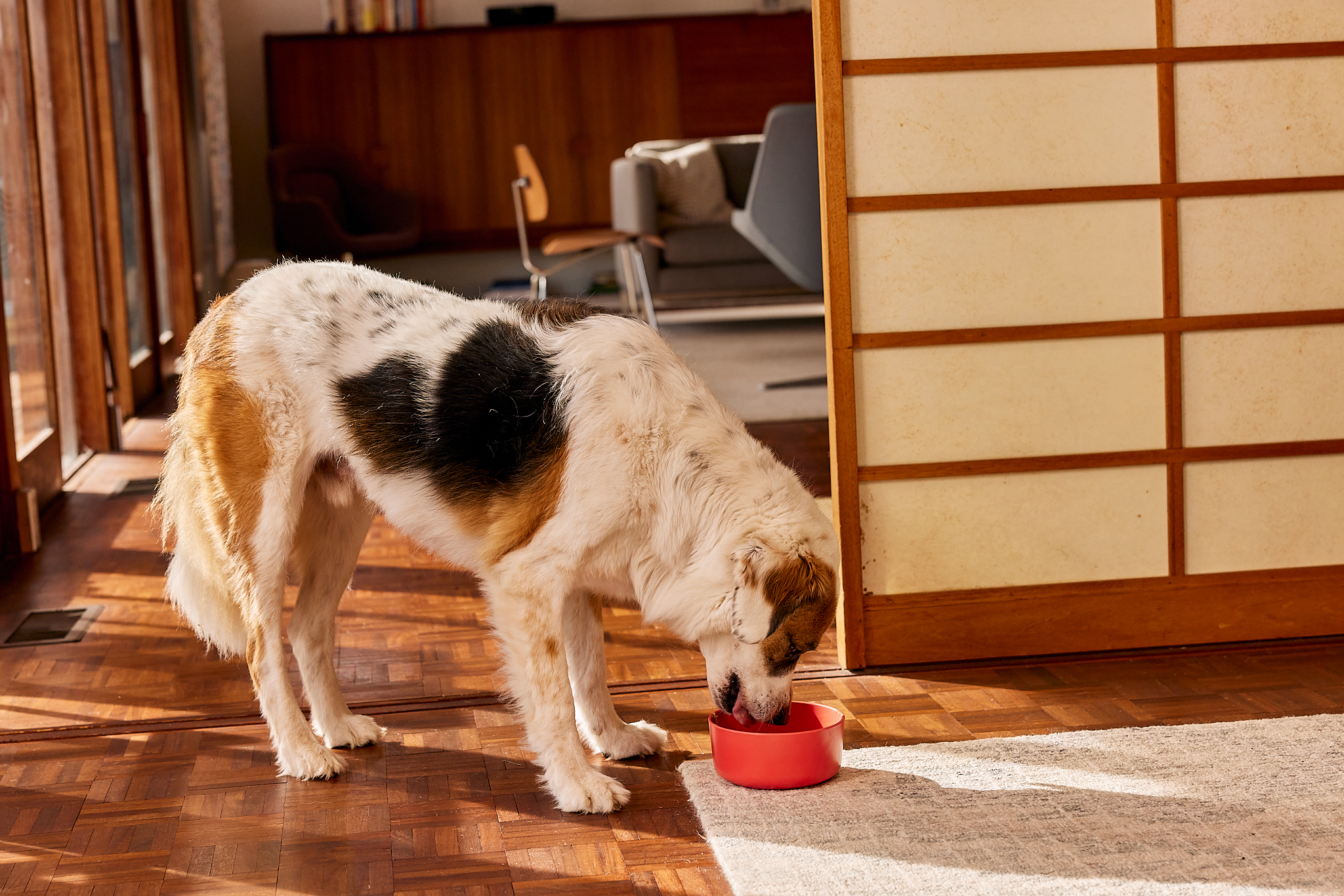Hey Ollie blog readers! We’re offering you an exclusive 60% OFF your starter box! Try now!
Probiotics are a popular human dietary supplement for digestive and immune system health, but are probiotics for dogs necessary? Can boosting your dogs’ gut microbes be advantageous or too much of a good thing? Read our guide to learn about the pros and cons of probiotics for dogs.
What are probiotics?
Probiotics are living microorganisms that, when administered in an adequate amount, provide their host with numerous health benefits. These organisms regulate the intestinal immune function, enhancing the gastrointestinal (GI) barrier function, and reducing the gut’s sensitivity to stress. In addition, probiotics may block disease-causing bacteria by hindering their ability to bind to the intestinal wall and by producing protective antibacterial substances.1
7 Best Dog Food Ingredients to Look For
Can I give my dog probiotics?
Probiotics are safe for dogs, but these bacteria are species-specific. Although probiotics intended for people aren’t harmful to dogs, they will not provide the same benefits as a dog-specific supplement. Probiotics that are beneficial to dogs include2:
- Bacillus coagulans
- Bifidobacterium animalis (strain AHC7)
- Bifidobacterium bifidum
- Bifidobacterium longum (BL999)
- Enterococcus faecium (strain SF68)
- Lactobacillus acidophilus
- Lactobacillus casei
- Lactobacillus plantarum
How are probiotics for dogs beneficial to their health?
Probiotics can be beneficial to your pup’s physical and mental wellbeing.
These microorganisms can enhance your dog’s health by doing the following:
- Promoting healthy digestion — Probiotics can boost healthy gut bacteria that helps your four-legged friend digest their food.
- Treating diarrhea — Studies have demonstrated that probiotics can help treat dogs’ acute gastroenteritis and inflammatory bowel disease.1
- Managing urinary tract infections (UTIs) — Some studies have shown promising results regarding probiotics in the prevention and treatment of dogs’ UTIs.3
- Boosting immune function — Your dog’s GI tract contains about 70% of their immune system. By normalizing digestive system conditions, probiotics help the canine immune system function properly.2
- Reducing anxiety — Your pup’s GI tract and brain communicate frequently, and healthy intestinal microorganisms can improve mental and emotional health. Dogs who received BL999 were less likely to bark, jump, spin, or pace in stressful situations, and they were also more likely to explore a new environment.2
- Decreasing allergic reaction episodes — Probiotics may decrease intestinal permeability and control inflammation, decreasing the number of allergic reactions they experience
How should I administer probiotics to my dog?
Canine probiotics come in many different forms, including supplement treats, capsules, powder, chewable tablets, and liquid. Probiotic-fortified dog food is also available. Most dogs willingly eat probiotics, but you can hide a probiotic capsule in a treat if your furry pal is picky.
Probiotics are measured in colony-forming units (CFUs), and the current recommendation for dogs is 1 to 10 billion CFUs per day.2 Ensure the product has not reached its expiration date, because probiotics lose potency and effectiveness over time.
Supplements for Dogs: Does Your Pup Need Them?
When should I give my dog probiotics?
You can give your dog probiotics on a regular basis to promote digestive health and immune function. Probiotic supplements are especially beneficial during these situations:
- Transitioning to a new diet
- Taking medication such as an antibiotic, nonsteroidal anti-inflammatory drug (NSAID), or steroid
- Being vaccinated
- Traveling
- Having surgery
- Experiencing emotional or physical stress
- Being boarded
- Recovering from a parasite infection
If your dog has an upcoming stressful event, such as receiving a vaccination, start administering a probiotic several days in advance so they have a healthy, well-functioning GI tract before they experience potential stress. Continue the treatment for several days after the event.
Do probiotics for dogs have side effects?
Canine probiotics are considered extremely safe, having few reported side effects. In rare instances, probiotics for dogs cause gas, stomach upset, and discomfort, particularly when starting the supplement.
Best Food For Dogs With Sensitive Stomachs & Digestive Issues
Are probiotics safe for puppies?
Specially formulated canine probiotic products are safe for puppies. However, you should always consult your veterinarian before adding beneficial microbes to your pup’s bowl.
Many veterinarians recommend probiotics at various times to support a puppy’s developing immune system and intestinal tract. Although puppies seem to have a worry-free life, they’re vulnerable to internal and external stressors (e.g., growth and development, training, diet changes), which can lead to loose stools. Supplemental probiotics can fortify your puppy’s resilience to life’s stressors and support healthy digestion.4
Can I give my dog yogurt?
Some foods you eat, such as yogurt, kefir, and fermented vegetables, have live cultures that may benefit your dog. You can give your dog plain, unsweetened yogurt products that don’t contain artificial sweeteners, such as xylitol, which is toxic to dogs. Recommended yogurt dosages for dogs include:
- Small dogs — One teaspoon per day
- Medium-sized dogs — Two teaspoons per day
- Large- or giant-breed dogs — Three teaspoons per day
7 Healthy Pup Ice Cream Recipes for Summer
How do I choose the best probiotic for my dog?
If your dog is experiencing GI upset, your veterinarian should rule out an underlying medical problem before you add a probiotic to your pup’s diet. If your goal is to promote your dog’s intestinal health, administer a probiotic that contains multiple live culture strains, and choose a product that requires refrigeration, because many shelf-stable probiotics are less potent.
How can probiotics for dogs help gastrointestinal issues?
Veterinarians often recommend probiotics for dogs when they experience GI and digestive problems. Your veterinarian may recommend you administer probiotics to your pup if they have one of these common afflictions:
- Diarrhea and loose stools — Changes in stool consistency and frequency can be caused by or contribute to an imbalanced gut microbiome (i.e., bad bacteria outnumber the good). Probiotics reintroduce healthy bacteria and help stabilize the intestinal environment.
- Constipation — Medication, illness, or a low-fiber diet can disrupt gut flora and cause constipation. Probiotics reduce unhealthy bacteria, improve intestinal motility, and soften stools by pulling water into the large intestine.
- Allergies — The canine GI tract contains 70% of their immune system, which is responsible for hypersensitivity reactions (i.e., allergies). Probiotics regulate the digestive tract and support proper immune function.
- Anxiety — Anxiety and stress aren’t traditionally considered GI issues, but new research has shown that specific probiotic strains can reduce dogs’ stress-induced behavior disorder signs.5
10 Signs You Need to Take Your Dog to the Vet STAT
What Is the Difference Between Prebiotics and Probiotics?
Probiotics are beneficial microorganisms that live in your dog’s GI tract, and prebiotics are fiber sources that nourish and promote probiotic growth. Prebiotics, which high-fiber foods provide, feed probiotics. If you are considering a probiotic for your dog, consult your veterinarian regarding the appropriate product and dose for your canine companion.
Get scientifically formulated probiotic supplement chews for your dog delivered right to your door with Ollie!


Healthier ingredients,
tailored recipes, delivered
Get 50% of your first box of Ollie’s fresh
delivered meals today with your probiotic!
Sources:
1.https://pubmed.ncbi.nlm.nih.gov/25576593/#:~:text=The%20history%20of%20probiotics%20goes,times%2C%20nearly%2010%2C000%20years%20ago.
2.https://zbiotics.com/blogs/journal/a-brief-history-of-probiotics-span-a-walk-down-memory-lane-from-the-beginning-of-probiotic-history-to-today-and-beyond-span.
3.https://www.vin.com/apputil/content/defaultadv1.aspx?pId=19840&catId=105877&id=8249656&ind=391&objTypeID=17.
4.https://www.vet.cornell.edu/departments-centers-and-institutes/riney-canine-health-center/health-info/power-probiotics.
5.https://pubmed.ncbi.nlm.nih.gov/24033665/.
Tagged As:

The nutrition your dog needs,
the food they want.

Enjoying our articles? Subscribe our Newsletters and get new articles directly to your inbox
You might also like
4 June 2025
7 MINS READ
Feed Their Future: Why Human-Grade Food Matters for Puppies
Among the many decisions you’ll make as a new pet parent, choosing the right food for your growing puppy is one of the most important. The quality of your puppy’s diet can impact their developme…
by Ollie Pets
4 June 2025
6 MINS READ
How Does Fresh Dog Food Compare to Homemade?
As pet parents become more conscious about what goes into their dog’s food bowl, many are considering alternatives to traditional kibble. Two increasingly popular options are fresh dog food and ho…
by Ollie Pets
4 June 2025
5 MINS READ
How Can Fresh Dog Food Help with Weight Management?
Maintaining a healthy weight is one of the most important aspects of your dog’s overall health and longevity. Being overweight or underweight can result in health complications and conditions that…







